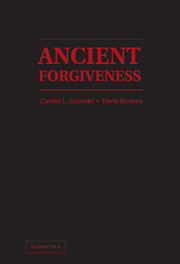31 results
10 - Being and Appearing: Self-falsification, Exchange and Freedom in Rousseau and Adam Smith
-
-
- Book:
- Adam Smith and Rousseau
- Published by:
- Edinburgh University Press
- Published online:
- 06 May 2021
- Print publication:
- 09 January 2018, pp 185-213
-
- Chapter
- Export citation
Contributors
-
-
- Book:
- The Cambridge Dictionary of Philosophy
- Published online:
- 05 August 2015
- Print publication:
- 27 April 2015, pp ix-xxx
-
- Chapter
- Export citation
Contents
-
- Book:
- Ancient Forgiveness
- Published online:
- 05 January 2012
- Print publication:
- 29 December 2011, pp v-vi
-
- Chapter
- Export citation
Part IV - Judaic And Christian Forgiveness
-
- Book:
- Ancient Forgiveness
- Published online:
- 05 January 2012
- Print publication:
- 29 December 2011, pp 135-136
-
- Chapter
- Export citation
Preface
-
- Book:
- Ancient Forgiveness
- Published online:
- 05 January 2012
- Print publication:
- 29 December 2011, pp xi-xvi
-
- Chapter
- Export citation
Frontmatter
-
- Book:
- Ancient Forgiveness
- Published online:
- 05 January 2012
- Print publication:
- 29 December 2011, pp i-iv
-
- Chapter
- Export citation
II - Forgiveness Among The Greeks
-
- Book:
- Ancient Forgiveness
- Published online:
- 05 January 2012
- Print publication:
- 29 December 2011, pp 15-16
-
- Chapter
- Export citation

Ancient Forgiveness
- Classical, Judaic, and Christian
-
- Published online:
- 05 January 2012
- Print publication:
- 29 December 2011
Contributors
-
- Book:
- Ancient Forgiveness
- Published online:
- 05 January 2012
- Print publication:
- 29 December 2011, pp vii-x
-
- Chapter
- Export citation
Bibliography of Works Cited
-
- Book:
- Ancient Forgiveness
- Published online:
- 05 January 2012
- Print publication:
- 29 December 2011, pp 237-252
-
- Chapter
- Export citation
Part I - The Territory Philosophically Considered
-
- Book:
- Ancient Forgiveness
- Published online:
- 05 January 2012
- Print publication:
- 29 December 2011, pp 1-2
-
- Chapter
- Export citation
Part III - Forgiveness Among The Romans
-
- Book:
- Ancient Forgiveness
- Published online:
- 05 January 2012
- Print publication:
- 29 December 2011, pp 77-78
-
- Chapter
- Export citation
Index
-
- Book:
- Ancient Forgiveness
- Published online:
- 05 January 2012
- Print publication:
- 29 December 2011, pp 253-260
-
- Chapter
- Export citation
14 - Socrates’ Political Philosophy
-
-
- Book:
- The Cambridge Companion to Socrates
- Published online:
- 28 March 2011
- Print publication:
- 22 November 2010, pp 333-354
-
- Chapter
- Export citation
1 - Imagination: Morals, Science, and Arts
-
-
- Book:
- The Cambridge Companion to Adam Smith
- Published online:
- 28 August 2006
- Print publication:
- 27 February 2006, pp 22-56
-
- Chapter
- Export citation
Frontmatter
-
- Book:
- Adam Smith and the Virtues of Enlightenment
- Published online:
- 10 November 2009
- Print publication:
- 13 November 1998, pp i-vi
-
- Chapter
- Export citation
Epilogue
-
- Book:
- Adam Smith and the Virtues of Enlightenment
- Published online:
- 10 November 2009
- Print publication:
- 13 November 1998, pp 355-376
-
- Chapter
- Export citation
4 - Philosophy and Skepticism
-
- Book:
- Adam Smith and the Virtues of Enlightenment
- Published online:
- 10 November 2009
- Print publication:
- 13 November 1998, pp 147-178
-
- Chapter
- Export citation
Index
-
- Book:
- Adam Smith and the Virtues of Enlightenment
- Published online:
- 10 November 2009
- Print publication:
- 13 November 1998, pp 401-412
-
- Chapter
- Export citation
5 - The Theory of Virtue
-
- Book:
- Adam Smith and the Virtues of Enlightenment
- Published online:
- 10 November 2009
- Print publication:
- 13 November 1998, pp 179-227
-
- Chapter
- Export citation

